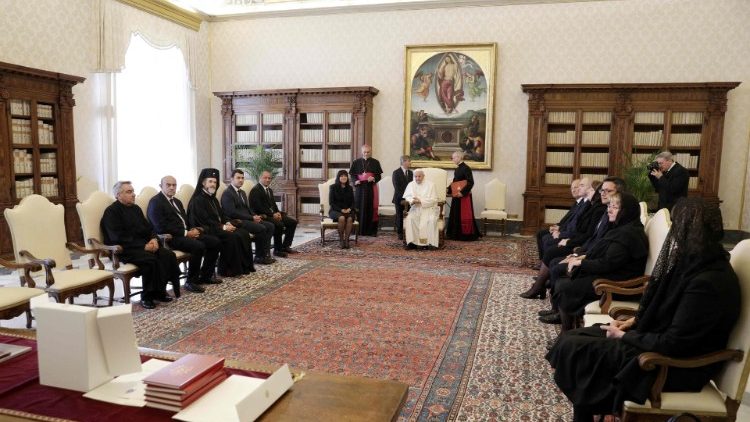Bulgarian, North Macedonian delegations meet Pope Francis
 Pope Francis on Friday received delegations from Bulgaria and North Macedonia, less than 3 weeks after the Holy Father visited the two East Balkan nations, May 5-7.
Pope Francis on Friday received delegations from Bulgaria and North Macedonia, less than 3 weeks after the Holy Father visited the two East Balkan nations, May 5-7.
In a statement to reporters, the "interim" Director of the Vatican Press Office, Alessandro Gisotti, said that Pope first thanked the Bulgarian delegation for the great welcome received during his recent visit to the country.
The delegation is on a traditional visit to Rome on the occasion of the feast of Saints Cyril and Methodius, the 9th-century evangelizers from Thessalonica who preached Christianity to the Slavic people.
Gisotti told reporters that the Pope was greatly impressed by the country's elders and the high regard that Bulgarian society has for them. Quoting a phrase by Gustav Mahler he read in the Vatican’s “L'Osservatore Romano” newspaper of Thursday, the Pope noted that this is a sign of the veneration of a tradition that is not "the custody of ashes, but the safeguarding of fire".
Gisotti also noted that the Pope was particularly touched by the 245 children who received First Communion in Rakovski. With particular affection, the Pope greeted Metropolitan Anthony and expressed words of great esteem for Patriarch Neophyte, who he described as a man of faith and a man of meekness and depth.
In a separate meeting with the official delegation from North Macedonia, the Pope thanked the authorities and the people for their welcome during the visit to their country. He particularly recalled the Mass in Skopje and the visit to the memorial of Mother Teresa of Calcutta.
The Holy Father also said that he was touched by the meeting with young Macedonians of different religions, and described it as an important sign of brotherhood. “Your people,” the Pope said “are historically the gateway to Christianity in Europe, which is a great thing.”
May 24 is a national holiday in Bulgaria that celebrates the nation’s culture and literature. It also celebrates the Cyrillic alphabet, that is said to have developed from the work of Saints Cyril and Methodious. St. Pope John Paul II included them in the group of the patron saints of Europe in 1980.
Source: Vatican NEws

